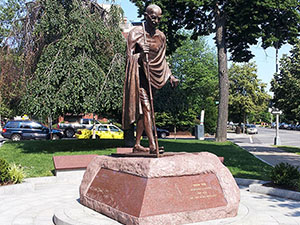Gandhi, the greatest political genius of our time, indicated the path to be taken.
He gave proof of what sacrifice man is capable once he has discovered the right path.
His work in behalf of India’s liberation is living testimony to the fact that man’s will, sustained by an indomitable conviction, is more powerful than material forces that seem insurmountable.
~ Albert Einstein
Mohandas K. Ghandi (1869 – 1948)
Known as ‘Mahatma’ (great soul), Gandhi was the leader of the Indian nationalist movement against British rule, and is widely considered the father of his country. His doctrine of non-violent protest to achieve political and social progress has been hugely influential.
Mahatma Ghandi Statue
2107 Massachusetts Ave. NW, Washington, DC 20008
GPS Coordinates: 38.911869-77.046632
The Memorial is accessible 7 days a week, 24 hours a day. The Mahatma Gandhi Memorial is located on a triangular island along Massachusetts Avenue, NW of Dupont Circle at Massachusetts Ave. & 21st St NW in Washington, D.C.
The Memorial is directly across the road from the Embassy of India. Defining the western tip of the triangular site, the Memorial plaza and statue are set against the backdrop of the existing canopy of trees including a 100-year-old Weeping Beech tree.
Respected Mr. Gandhi
I use the presence of your friend in our home to send you these lines. You have shown through your works, that it is possible to succeed without violence even with those who have not discarded the method of violence. We may hope that your example will spread beyond the borders of your country, and will help to establish an international authority, respected by all, that will take decisions and replace war conflicts.
With sincere admiration,
Yours
(Signed, ‘A. Einstein‘) (1931)
It was wonderful to be in Gandhi’s land, to talk with his son, his grandsons, his cousin and other relatives; to share the reminiscences of his close comrades; to visit his ashrama, to see the countless memorials for him and finally to lay a wreath on his entombed ashes at Rajghat.
I left India more convinced than ever before that non-violent resistance is the most potent weapon available to oppressed people in their struggle for freedom. It was a marvelous thing to see the amazing results of a non-violent campaign. The aftermath of hatred and bitterness that usually follows a violent campaign was found nowhere in India. Today a mutual friendship based on complete equality exists between the Indian and British people within the commonwealth.
The way of acquiescence leads to moral and spiritual suicide. The way of violence leads to bitterness in the survivorsand brutality in the destroyers. But, the way of non-violence leads to redemption and the creation of the beloved community.
~ Martin Luther King



